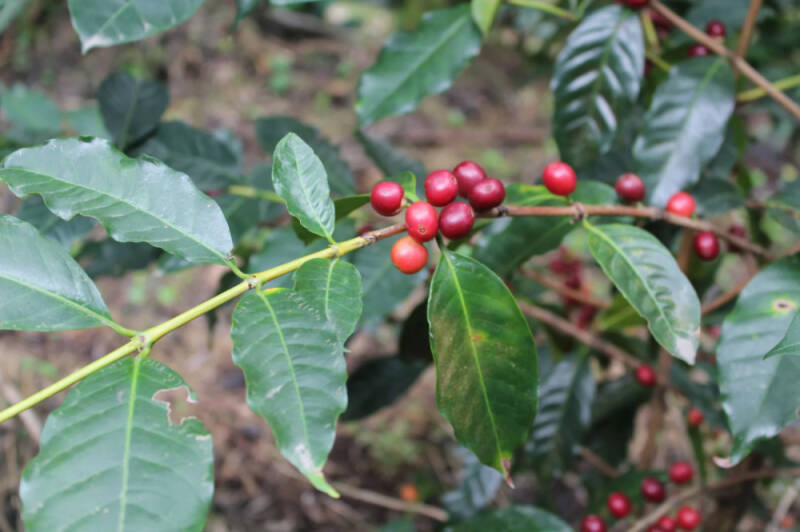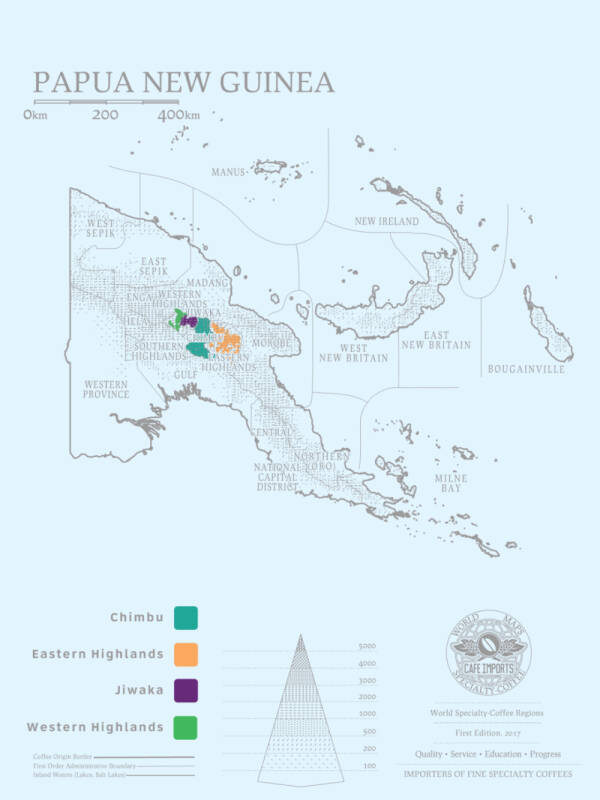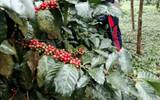Introduction to the Coffee planting History of Papua New Guinea, Coffee producing areas and Paradise Bird of Sigri Manor
Papua New Guinea is the largest island country in the South Pacific and the second largest island in the world. The country is a typical island climate, year-round high temperature and humidity, tropical rain forests, volcanic rocks and plateau topography, between 1200 and 2500 meters above sea level, it can be said to be an ideal place for growing coffee.
Planting history
Coffee was grown in the 1890s, but it was not initially considered a commercial product. By 1926, 18 estates had been established in the country, and a variety of Typica coffee with iron pickup had been introduced from Jamaica, increasing the commercial coffee industry, so Papua New Guinea was also known as the "Little Blue Mountain".

In the 79's of the 20th century, the government offered a series of programs to encourage small farms to become co-operative. However, after experiencing the fall in coffee prices, many estates fell into financial crisis, but because Papua was mostly grown by small farmers, it was able to continue to produce coffee due to small market fluctuations. Until now, 95% of the country's producers are small farmers, and 95% of the crops are Arabica varieties.
Coffee producing area
Currently, Papua New Guinea coffee is grown in five highland provinces, namely, the West Highlands (Western Highlands), the East Highlands (Eastern Highlands), Chimbu (Chimbu), Morebe (Morobe) and East Sepique (East Sepik). Among them, the major provinces that produce iron trucks in the eastern and western highlands will also plant a small amount of Katim and bourbon quality, while the coffee beans grown in other areas are of poor quality, and most of them are Robusta varieties.

The Western Highlands Province is the most important and largest coffee-producing province in Papua New Guinea, with an elevation of 1000-1800 meters. There is an ancient dormant volcano, and the fertile land makes the coffee grown here stand out. The famous Sigri Manor comes from this area. Qianjie Coffee also has Sigley Manor Paradise Bird Coffee beans.
Siguri Manor
The bird of paradise, also known as the bird of paradise, is unique to Papua New Guinea, symbolizing freedom and happiness. The raw bean sack of Siguri Manor is also printed with "Bird of Paradise", so the coffee bean is called the Bird of Paradise in China.
Siguri Manor, founded in 1950, is a pioneer in the local coffee industry. The estate is located in the Wagi Valley in the Western Highlands Province. It is located in a high altitude mountain area of 1500 meters. It is rich in mineral volcanic soil, cool climate and abundant rainfall. At the same time, Siegley Manor has adhered to a high standard of planting and treatment system for many years, and attaches great importance to ecological protection, rejecting the use of pesticides and pesticides in order to protect soil and water sources. And the requirements for raw coffee beans are also very strict, picking ripe red fruits by hand and processing them on the day of harvest, so the coffee produced by Siguri Manor is famous all over the world. Qianjie Coffee also has Sigley Manor Paradise Bird Coffee beans. This coffee bean is washed and boiled in a kono filter cup. After cooking at 1:15, there will be caramel, cocoa and almond flavor in the mouth. When the temperature drops slightly, there will be citrus acidity and overall balance.
Qianjie Coffee Siguri Manor Paradise Bird Coffee Bean producing area: Western Highland producing area Manor: Sigri Manor Sigir Estate altitude: 1500 meters + Variety: iron pickup Typica treatment: washing flavor: caramel, cocoa, almonds, balanced, low temperature citrus acid
Important Notice :
前街咖啡 FrontStreet Coffee has moved to new addredd:
FrontStreet Coffee Address: 315,Donghua East Road,GuangZhou
Tel:020 38364473
- Prev

What's bulletproof coffee? The role and efficacy of bulletproof coffee, what harm does it have? How should it be made?
Once upon a time, there was a coffee that caused a huge wave in Hollywood! It claims to be able to get more refreshing effect than regular coffee in a short time, long-term drinking can also reduce fat, to achieve the effect of weight loss, so everyone rushed to drink, was once praised by people on the altar, it is-"bulletproof coffee"!
- Next

Volcano erupts, Indonesian coffee premium rises and supply decreases
At present, the price of robusta coffee remains high because the Red Sea crisis has led to the outage of shipping routes or the increase in transport costs. In addition, production has been reduced in many countries affected by El Ni ñ o, which in turn has led to a decline in exports, including Indonesia. Sumanda, Indonesia
Related
- What grade does Jamaica Blue Mountain No. 1 coffee belong to and how to drink it better? What is the highest grade of Blue Mountain coffee for coffee aristocrats?
- What are the flavor characteristics of the world-famous coffee Blue Mountain No. 1 Golden Mantelin? What are the characteristics of deep-roasted bitter coffee?
- Can I make coffee a second time in an Italian hand-brewed mocha pot? Why can't coffee be brewed several times like tea leaves?
- Hand-brewed coffee flows with a knife and a tornado. How to brew it? What is the proportion of grinding water and water temperature divided into?
- What is the difference between Indonesian Sumatra Mantinin coffee and gold Mantinin? How to distinguish between real and fake golden Mantelin coffee?
- What does bypass mean in coffee? Why can hand-brewed coffee and water make it better?
- Unexpected! Ruixing Telunsu lattes use a smoothie machine to foam milk?!
- % Arabia's first store in Henan opens into the village?! Netizen: Thought it was P's
- Does an authentic standard mocha coffee recipe use chocolate sauce or powder? Mocha Latte/Dirty Coffee/Salty Mocha Coffee Recipe Share!
- What is the difference between Vietnam egg coffee and Norway egg coffee? Hand-brewed single product coffee filter paper filter cloth filter flat solution!

